Cats that Have Lived with Shirley Rousseau Murphy
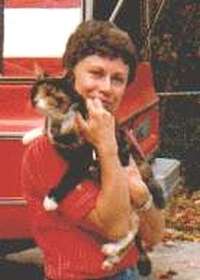 Mousse, the inspiration for
Mousse, the inspiration forMelissa in The Catswold Portal.
Cats have been an important part of Shirley's Murphy's life. "My family always had cats," she says. "At the stables where I spent most of my childhood, cats were my playmates along with the dogs and horses and a billygoat. And at home, our tomcat, Skipper, ruled; he played hide-and-seek with my mother, leaping out at her from the hall closet--but he didn't like her to do the leaping, that hurt his feelings. And he didn't like mirrors. Once when a house guest laughed at him for growling into a mirror, Skipper jumped onto her lap, drew back his paw, and slapped her hard in the face. This is the same cat who brought his lady-love home for dinner every night while she was pregnant, then helped take care of the kittens.
"At the stables we had Peggy, a gray shorthair who, walking atop the pasture fence, would step onto the back of the gentlest old gelding and take a little ride. Peggy would run beside my father when he went to irrigate the pastures. Wading hip-deep in water, she watched for the first rabbit to escape from its burrow--but not from her swift claws. Catching it, she would drag it across the flooded pasture to her kittens, to teach them about wild game and about the finer points of hunting.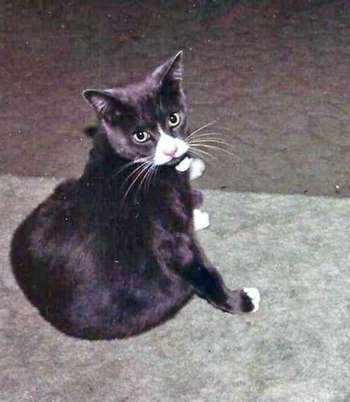 The original Joe Grey
The original Joe Grey
"When my husband was a young probation officer, in San Bernardino, he was often gone for several days. We had two black cats then, and on a summer midnight I woke to see Scrappy pacing in the open window, growling like a little panther. Peering out, I saw a man standing in the bushes--he could have stepped right through the window. I was young, and frightened. I phoned my neighbor, he called the police, and they caught the prowler. Several years later, when we lived in Panama, again I woke at night to Scrappy's growling from the open window. I looked down, from the second floor this time, to see a man slipping through the yard. But when I called the cops, they laughed. 'It's okay,' they said, 'he's one of ours.' But how was Scrappy to know the guy was an undercover officer? A prowler is a prowler, and my little watchcat got double rations the next morning.
"Our most recent cats came to us when we lived in Georgia. Among them were Mousse, who inspired Melissa in The Catswold Portal, and the original Joe Grey. I met the cat who inspired Joe Grey while living in Atlanta--a skinny, half-grown kitten belonging to some neighbors who were so obtuse they put his meals on the floor. Their big dogs got it all. The kitten hadn't a chance. Nearly starving, he found he could slip in through our cat door to share supper with our calico, Mousse. She didn't like that much, but Joe prevailed; we doubled the rations; and when he appeared one day with a broken, infected tail, we asked the neighbors if we could have him. We could, with pleasure!
 Joe Grey, who inspired the series named for him
Joe Grey, who inspired the series named for him
"When our friend got married, Joe was soon running a household of dogs amd cats with iron-clawed authority. An indomitable and clever tomcat, his masterful attitude soon inspired a brand new leading character: a smart-mouthed detective, a high-rolling feline sleuth.
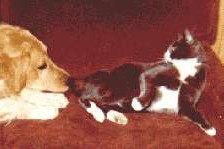 Joe Grey with a dog.
Joe Grey with a dog.
After Mousse came Lucy, then ELT. Lucy was two years old when we got her from our local volunteer rescue in Georgia. They had trapped her and had found her litter of kittens. They caged her with her litter, and found homes for the babies. When we took her, she weighed four pounds, just a handful of scruffy fur over bones; she had spent all her strength hunting, to keep herself and her kits alive. You could feel every vertebra, every rib. But before long she was eight pounds of silky purring loveliness, And still, every spring (though she was now spayed) she again became preoccupied and agitated, needing to hunt, needing to provide for the kittens that were still there in some secret part of her memory.
 Shirley Murphy's cat Lucy.
Shirley Murphy's cat Lucy.
"When he brought her home, she took over our house, bullying shy Lucy, storming up the bookcases like she was going to the moon, walking on the overhead beams, totally trashing my desk, destroying whatever efficiency I'd managed. More than one finished manuscript went to HarperCollins with claw marks and muddy pawprints on the pages. She loved to chase a flock of full-grown Canadian geese into the lake. She would race into the water up to her belly, stand watching them flap away through the water honking and scolding, and would return to the house wet and muddy, hugely pleased with herself.
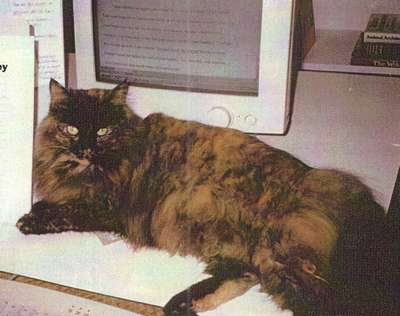 ELT, the inspiration for Kit in the Joe Grey series.
ELT, the inspiration for Kit in the Joe Grey series.
"Our first two years in Carmel were spent living with ongoing construction. Eating, sleeping and working among open ladders, torn out Sheetrock, and stacks of new lumber as our contractor repaired the understructure of our hillside house and then remodeled the main floor. During that time we moved the cats' headquarters from room to room, to keep them safe. Evenings, when the workers had gone home, were playtime. During those two years amidst the turmoil of phone calls, guys knocking on my study door with questions, sometimes no heat, or the power turned off, and always the banging of hammers and the scream of electric saws, the cats and I found what privacy we could while I worked on the Joe Grey mysteries. The cats were bored, and often frustrated, but they weathered the turmoil very well.
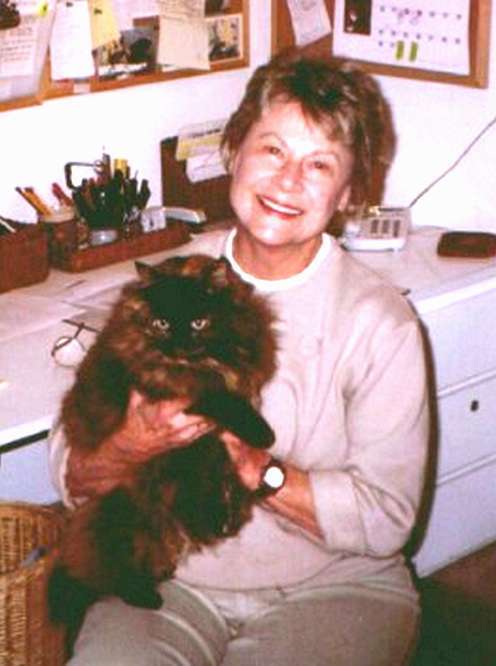 Shirley holding ELT.
Shirley holding ELT.
"Both cats loved having a carpeted house, rather than wood floors. Carpet is the surface of choice for good traction during those fast, runaway chases. And they hung out a lot on the bookshelves in my study, where I have baskets secured by cord. One bookshelf with no back stands at the end of my computer desk, in front of the window, with a wide view of the patio. But of course the two prime locations were between my monitor and keyboard, and atop any open manuscript that I happened to be editing.
"To imagine our lives without cats stirs such an empty feeling. To imagine our human world without any animals at all, is, for me, to imagine a vast and empty void sterile in the extreme. No bird, no beast. No warm fur to stroke, no mute friend who is yet so eloquent, no eye of another species in which to gaze and speculate, no wondrous and tentative communication with one who is not like us. To be surrounded only with other humans--who are often very dull--to encounter no other form of intelligence or joyfulness or wit, seems to me unthinkably tedious."
Read The Cat as Muse, an article from Cats USA magazine in which Shirley talks about how cats have inspired her writing.